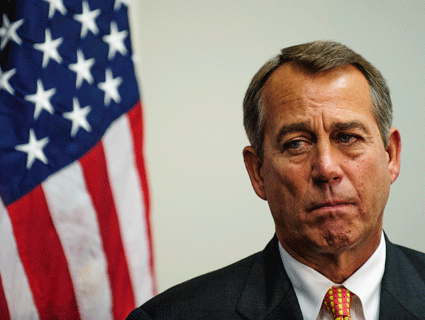
Pete Marovich/ZUMAPress
In recent days, as $1.2 trillion in automatic spending cuts—a.k.a. sequestration—have neared, Republicans have tried mightily to depict this indiscriminate slashing as President Barack Obama’s doing (while also accusing Obama of fear-mongering regarding the cuts’ recessionary impacts). They have gleefully asserted that it was the White House that first suggested sequestration as a means to resolve the debt ceiling impasse created by GOPers in 2011. But their accusation has been undermined by a fact recently highlighted in multiple media accounts: When they passed the sequestration bill, House Speaker John Boehner and Senate Minority Leader Mitch McConnell, the top GOPers in Congress, each accepted sequestration as it was designed—that is, as a legislative doomsday machine that would force a so-called congressional supercommittee to come up with a deficit reduction plan to supplant these deep across-the-board cuts in defense and nondefense spending.
But there is a GOP fallback claim: The sequestration-defusing plan cooked up by the supercommittee was not supposed to have any tax revenue hikes in it. Consequently, the Republicans maintain, Obama is disingenuous now to call for side-stepping the sequestration with a “balanced” approach that includes spending cuts and revenues. Indeed, Boehner and other GOPers crowed at the time that the debt ceiling deal did not include any tax hikes. Yet the deal Boehner approved did nothing to limit the supercommittee to considering only cuts for a sequestration-ducking plan. The legislation did allow for the possibility of revenue boosts. In a fact sheet, the White House was explicit on this point, noting the supercommittee would ponder “both entitlement reform and revenue-raising tax reform.” And Boehner essentially acknowledged that at the time.
In an interview in his Capitol Hill office with CBS News’ Scott Pelley, on August 1, 2011, the day after the last-minute debt ceiling compromise was crafted, Boehner boasted, “When you look at this final agreement that we came to with the White House, I got 98 percent of what I wanted. I’m pretty happy.” Talking to Pelley, Boehner showed no concern about the sequestration and didn’t blame Obama for it. Moreover, he did not say revenues were out of bounds for the supercommittee:
Pelley: If this supercommittee that you talk about recommends raising revenue, can you support that?
Boehner: We’ll see what it does. But I’m confident their focus will be on reducing expenditures coming out of Washington.
Pelley: Can you image Republicans backing increased taxes?
Boehner: I think that would be a stretch. It doesn’t seem likely to me that that would be recommended, much less supported, but I’ve been surprised before.
Certainly, Boehner did not endorse what obviously would be the Democrats’ position in the coming supercommittee deliberations: more revenues. But he did recognize—if only theoretically—that this could be part of a final plan. In fact, his statement to Pelley, which was no knee-jerk expression of opposition to revenues, could be seen at the time as sign of flexibility. In the immediate wake of the deal that averted a national default—before any members of the supercommittee were named—Boehner was acknowledging the possibility that the supercommittee could produce a compromise with revenues.
Six weeks later, Boehner did make news when he gave a speech and declared that he and his Republican comrades would not support any supercommittee proposal with increased revenues. Only cuts in spending and entitlements could be considered, he asserted—not even such tax reforms as closing loopholes.
At that point, Boehner was tacking back to GOP-friendly waters, as the next round in the debt wars was starting. (And, not surprisingly, with Republicans saying no to any new revenues, the bipartisan supercommittee soon failed to reach an agreement.) Yet when Boehner had cut the deal, he neither bemoaned the sequester nor ruled out the possibility that Obama and the Republicans would avoid these ham-handed cuts with a deficit-reduction package containing some increase in tax revenues. As they try to blame Obama for the looming sequestration and insist that the president is playing dirty by urging a sequestration escape plan with revenues, Republicans are demonstrating hypocrisy or amnesia—or maybe both.













